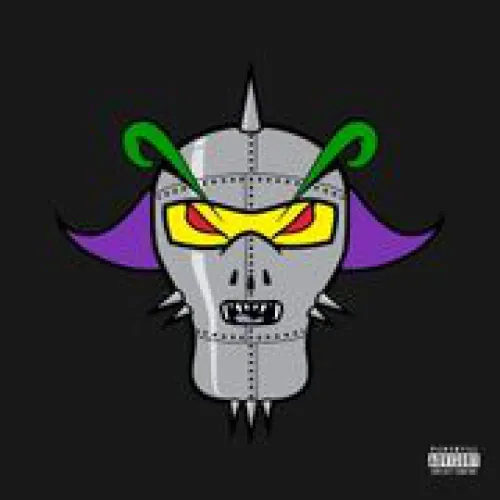
Insane Clown Posse
Top Insane Clown Posse albums
Top Insane Clown Posse lyrics
24s On A '84 - Esham And Shaggy 2 Dope W/tnt
Insane Clown Posse85 Bucks an Hour (feat. Twiztid)
Insane Clown PosseInsane Clown Posse biography
Insane Clown Posse are a cartoonish metal/rap band with a vaunted live show that featured open fires, chainsaws, liters of soda dousing the audience (Faygo being the group's favorite brand), and more emphasis on performance art than the performance of music. In the world of the late '90s, that was more than enough to get them a recording contract with a major label, though the release of their 1997 album The Great Milenko came with a bit of controversy. Now just a duo, ICP were originally formed in 1989 as a hardcore Detroit rap group called Inner City Posse. After combusting in 1991, the only members left, Violent J (born Joseph Bruce) and Shaggy 2 Dope (born Joseph Utsler), slightly altered the name to reflect the fact that they had been visited by the Carnival Spirit, which ordered them to carry word of the impending apocalypse by touring the nation and releasing six "Joker Cards" (popularly known as LPs) with successive revelations of the final judgment. The first, Carnival of Carnage, appeared in 1992 on their own Psychopathic Records label. The group became notorious in Detroit's underground scene, but several tours around the region failed to ignite much more than the rage of area leaders.br /br /After the release of 1994's The Ringmaster, ICP began to get a bit of attention as a possible follower of cartoon metal bands like Gwar and Green Jelly. Jive Records signed the group and released The Riddle Box in 1995, but the record bombed and ICP returned to the ranks of the indies. Just one year later, Hollywood Records gambled on the band and spent more than one million dollars while ICP recorded their new album, The Great Milenko. On the day of release in 1997, however, Hollywood pulled the record, citing obscene lyrics and gruesome content -- possibly a move by its owner, Disney, to deflect criticism of its practices by the Southern Baptist Federation. In a bizarre twist, yet another major label, Island Records, stepped in to release the album and capitalize on the notoriety ICP had garnered. That notoriety only increased thanks to several incidents that kept them in the headlines: J was arrested after clubbing an audience member with his microphone in late 1997, and shortly thereafter, the group's tour bus ran off the road, leaving J with a concussion. Next, the group and their entourage were involved in a brawl at a Waffle House in Indiana, and both members eventually pleaded guilty to disorderly conduct charges. All the chaos took its toll, as J suffered a panic attack in April 1998 while on-stage in Minnesota. However, all of the publicity helped expand the group's cult following to the point where their next album, the 1999 concept record The Amazing Jeckel Brothers, debuted in the Top Five. As evidenced by the numerous different collectible covers for The Amazing Jeckel Brothers, ICP had become a virtual merchandising machine, complete with comic books to flesh out their elaborate "Dark Carnival" mythology; they also wrote and starred in their own straight-to-video movie, Big Money Hustlas, and made guest appearances at wrestling events. The group spent the summer of 1999 bickering with various tourmates (Coal Chamber in particular), and played at the ill-fated Woodstock '99. Early in 2000, Shaggy collapsed on-stage, but the cause was deemed to be nothing more than a combination of the flu and low blood sugar; however, while staging a wrestling event several months later, Shaggy fell off of a steel cage, breaking his nose and cheekbone. Still, ICP managed to make it into the studio to record a follow-up album, and Big Money Hustlas was finally released that summer. On Halloween 2000, the group issued their sixth album, which apparently did not count (as all the other albums had) as a "joker card" (in the ICP fantasy world, the sixth joker card was supposed to signal the apocalypse). Similar to Guns N' Roses' Use Your Illusion, the album was released in two completely different, separate versions, titled Bizzar and Bizaar. Finally needing to live up to the years of hype, 2002's The Wraith: Shangri-La revealed that the hidden message of their music was always to follow God and make it to heaven. Considering the murder fantasies of "Beverly k**s 50187" and the necrophilic overtones of "Cemetary Girl," this may have been a shock to long-time fans. In August 2004 the band released the sixth and final joker card, Hell's Pit, in two separate editions. Both had the same CD but were packed with differnt DVDs. But the Dark Carnival wasn't fully shuttered. Spring 2005 found ICP hyping a new direction for the mythology, to be revealed with the May release of Calm. The EP also prepped Insane Clown Posse's devoted fan base for the sixth annual Gathering of the Juggalos that July. ~ John Bush, All Music Guide
